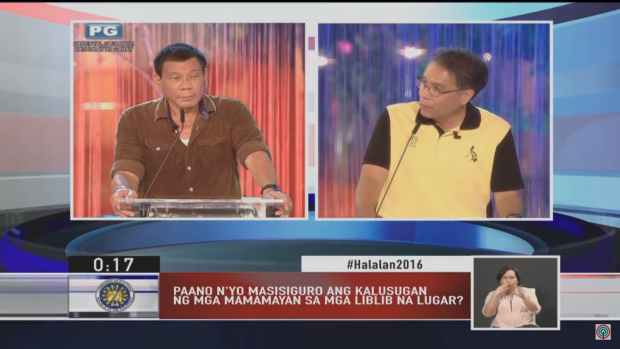The third and last presidential debate sanctioned by the Commission on Elections may be remembered as a contest between the easy populism of the charismatic front runner, Davao City Mayor Rodrigo “Digong” Duterte, and the determined earnestness of the fourth-placing policy wonk, former Interior Secretary Mar Roxas.
The debate’s town hall format was arguably favorable to Roxas, who gave detailed, well-researched answers. But presidential debates like the game-changing series organized by the Comelec and leading media organizations are not won or lost in the conventional sense. Rather, debates like these help frame the candidates’ narratives. The Dagupan City debate highlighted some of the differences between the candidates, but the contrast was sharpest between the entertaining Duterte and the serious Roxas.
Three examples:
To the first question about Chinese coast guard harassment of Filipino fishermen in the West Philippine Sea, Duterte gave a characteristic answer: Personal and even heroic. He said he wants to plant the Philippine flag at the reef or shoal marking the boundary between Philippine and Chinese claims, and then let China deal with the consequences. At one point, he even referred to his long-standing desire to be a hero.
Roxas’ answer was to highlight the multiple approaches the Aquino administration had already set in motion.
To the question about “endo” or the “illegal, possibly unconstitutional” practice (in the words of Sen. Miriam Defensor Santiago) of contractualization, Duterte said the practice would “stop” the day he assumed office as president.
Roxas said he would also stop the practice, which is prevalent in industries like retail. In truth, all candidates, including Vice President Jejomar Binay and Sen. Grace Poe, took a clear stand against it.
But Roxas pointed out that there was a legal loophole that needed to be filled: A new law must be passed that will allow the labor memorandum circulars to take place. He promised that the new law would be passed within six months.
In another pass, Duterte acknowledged that the law must be amended, and amended his answer to the less populist “one week.” On the day the chambers of Congress convene, he said, he would ask both the Senate president and the Speaker of the House to pass the new law within a week.
The skirmish between Duterte and Roxas in the fourth part of the debate was the only time when the fireworks of the previous debates flashed on stage.
In answer to a moving health care question from a member of the audience, Roxas spoke, among other particulars, of the widely expanded coverage of the government’s PhilHealth program.
Duterte retorted that there was no such thing in Davao, where he has been mayor for over two decades. He referenced his application filed “two years ago,” and said nothing has happened to it.
Roxas returned with a dare. He would give Duterte by 8 am on Monday a complete list of “thousands” of Davao City residents who have availed themselves of the PhilHealth expansion. Then he challenged Duterte to withdraw if such proof existed.
It may have been the only time during the three-hour debate that policy earnestness had a ready retort to the pleasing populism of dramatic answers.
RELATED STORIES
Presidential bets cordial at final debate in Pangasinan
Miriam comeback story takes center stage
Format restrains candidates in first half, focuses on issues
